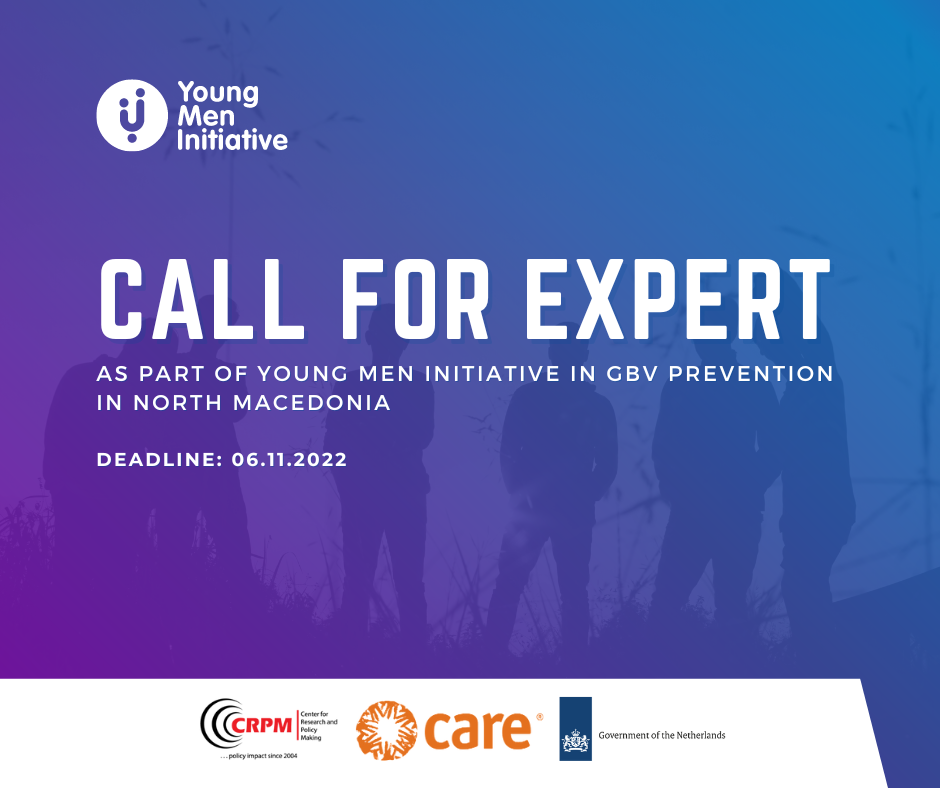Terms of Reference (ToR) for engagement of one (1) expert i.e., Lead Researcher for conducting written research within PLA assessment (10 working days)
as part of Young Men Initiative in GBV Prevention in North Macedonia
in the period 15th November – 30th December 2022
Deadline for application submission: 6th November 2022
ABOUT THE PROJECT
In 2022, Center for Research and Policy Making, in cooperation with CARE International Balkans, started with implementing the new project titled “Building healthy lifestyle habits of boys in Gostivar and Gjorce Petrov” with the support of the Netherlands Embassy in Skopje.
The goal of the project is to positively transform the behavior of young men and boys for building tolerant societies and prevent peer and gender-based violence. The local government and the local civil society organizations are involved in this initiative, which will mobilize young people aged 14-19 years to determine the priorities and participate in the creation of local policy for young people through educational workshops and campaigns in the community.
The project will:
- Improve understanding and raising awareness of violence as learned masculine behavior in the Balkans, among boys, youth civil society organizations and relevant government institutions;
- Adapt CARE’s approach by engaging young men and boys and YMI methodology at national level as youth-led gender-based violence (GBV) prevention model;
- Increase capacities of local civil society organizations to deliver CARE’s approach by engaging young men and boys through YMI methodology (Young Men’s Initiative), as youth-led gender-based violence (GBV) prevention model.
YMI Background
Young Men Initiative (YMI) project started in 2006 and it is being implemented in Bosnia and Herzegovina, Serbia, Croatia, Kosovo* and Albania. The project builds on CARE´s comprehensive and programmatic effort to prevent interpersonal and gender-based violence as well as to promote gender equality in the region. YMI is targeting youth to build their knowledge and attitudes concerning gender equality and healthy lifestyles and to decrease levels of all types of violence. YMI started with a small size qualitative research exploring young men`s attitudes and behaviors, then over the years grew into a comprehensive program with different components targeting young people, parents, teachers, educational workers, university students, journalists and other important stakeholders. Since the beginning, the YMI has directly worked with over 120,000 youth in over 230 high schools and over 1,600 high school teachers, while various educational programs and campaign activities reached 750,00 people throughout the Balkans. For the first time this approach is being implemented in Macedonia with project managed by CRPM and CARE.
The core of the YMI intervention is a series of group educational workshops accompanied with social norms campaign that promote a critical and personal reflection on gender, masculinities and health, with a strong focus on violence prevention. The base for the programming is participatory learning and action (PLA) conducted with male youth, youth facilitators and youth service agencies (YSA) to determine the specific gender norms and expectations that contribute to violent behavior among young men in Bosnia, Croatia, Montenegro and Serbia.
Participatory Learning and Action (PLA)
Participatory Learning and Action (PLA) is a type of qualitative research, which is used to gain an in-depth understanding of a community or situation. It is widely used in work involving local communities in order to assess and outline social context and all other research-relevant topics. PLA is a participatory methodology which is conducted with the full and active participation of community members. The main purpose of PLA is to support people within communities to analyze their own situation, rather than have it analyzed by outsiders. Additionally, PLA is an approach used by many development workers to enable participants to share knowledge and insight about their community and its needs, and to determine ways to address those needs.
The main principles of PLA are:
- To involve people in issue identification and its resolution, and to increase their ability to act on their own behalf;
- To learn from people and their experiences, and for development experts to “hand over the stick” so that people themselves analyze, present, and determine the outcome of the information that has been collected;
- To adopt an informal approach and to be flexible in changing it if necessary;
- To assess people’s perceptions and identify, prioritize and appraise issues from their knowledge of local conditions;
- To conduct field work in a relaxed manner by listening, probing, not imposing, and allowing all different types of people to have a say.
Examples of PLAs conducted by CARE:
The primary focus of the participatory learning and action (PLA) research is to work with male youth, youth facilitators and partner organizations to determine the specific gender norms and expectations that contribute to violent behavior among young men in North Macedonia. To determine these norms and expectations, the PLA will be guided by the following five general research questions:
Research question 1: What are the current social constructs, attitudes and experiences for young men, especially with regard to hegemonic masculinity?
Research question 2: How do social institutions such as media, school, religion, family and peers influence social constructs of masculinity?
Research question 3: What are the ranges of young men’s attitudes and behavior toward women and their relationship with women?
Research question 4: How are social constructs of masculinity related to men’s violent use of power?
Research question 5: For men who are not violent, what are the influencing factors and consequences?
In line with above-mentioned directions, the role of the Lead Researcher is as follows:
- To participate in briefing and debriefing with CARE experts related to PLA implementation (2 working hours)
- To participate in the debriefing meetings and collaborate with the Peer Facilitators to prepare PLA methodology (2 working hours)
- To observe the data collection with the Peer Facilitators during PLA (two workshops) – (4 working days)
- To analyze pre and post tests for PLA participants that will be disseminated by CRPM and partner organizations during working sessions (4 working hours)
- To analyze collected, transcribed and translated inputs from PLA sessions and produce a PLA Report in English which consists of context analysis in accordance with above-presented general research questions and propose adaptation of YMI program if necessary. (5 working days)
Lead Researcher Qualifications
- Experienced expert preferable from the field of social psychology or other related field relevant for conduction of qualitative scientific research with youth.
- Possession of minimum master’s degree in social related sciences and/or at least three years of experience in the field of quantitative and qualitative research, data analyzing and reporting
- Comprehensive experience in conducting similar analysis (The applicant is requested to send several samples of prior assessments written by him/her) especially relevant to gender inequality.
- Prior experience with projects targeting gender mainstreaming, violence and conflict prevention.
- Excellent English language skills (both oral and written)
- Strong communication skills, ability to recognize and respond to participants’ needs, willingness to implement constructive feedback
The role of the CARE (and CRPM) is as follows:
- To supervise and guide PLA methodology development, tools and brief Lead Researcher as well as train Facilitators in the PLA process
- To coordinate and give support in PLA implementation
- To facilitate the data collection of in the target communities with support from the Lead Researcher and partner organizations
- To participate in the debriefing meetings and collaborate with the Lead Researcher to develop a daily report;
- To contribute to the preliminary data analysis of Phase I data collection;
- To work with the Country Lead Researcher to disseminate and present final results of PLA
APPLICATION PROCEDURE
The interested candidates are invited to submit Letter of interest, CV, financial offer (with specified gross amount per working day) and List of relevant information/research demonstrating their previous experiences in research field to perform the task.
The application should be sent by email to:
Subject: Application for Lead Researcher for conducting written research within PLA assessment.
The deadline for submission is November 06, 2022.


